The world of marketing is transforming at lightning speed, with automation marketing tools leading the charge. In fact, 78% of companies are already harnessing these solutions to fuel growth and outpace competitors. In 2025, automation marketing tools are not just a trend, they are a necessity for businesses seeking greater efficiency, deeper personalization, and higher ROI. This article explores the top 10 platforms poised to help you streamline your workflows, captivate your audience, and achieve measurable results. Discover expert insights into standout features, pricing, and practical tips to select the ideal solution that will elevate your marketing strategy.
Why Automation Marketing Tools Are Essential in 2025
The marketing landscape is evolving rapidly, and automation marketing tools have become the driving force behind this transformation. In 2025, these platforms are not just a trend but a necessity for businesses aiming to stay competitive. Companies across industries are rethinking their strategies to put automation at the core, enabling them to keep pace with changing customer expectations and market demands.
Automation marketing tools empower teams to streamline repetitive, manual processes. By automating everyday tasks, marketers can focus their energy on creativity, campaign strategy, and high-level decision-making. This shift reduces human error and increases productivity, allowing businesses to achieve more with fewer resources. The result is a leaner, more agile marketing operation that can respond quickly to new opportunities.
Unlocking Personalization and Customer Engagement
Personalization is now a baseline expectation, not a luxury. Research shows that 84% of customers prefer brands that deliver tailored experiences. Automation marketing tools make this possible at scale, leveraging data to segment audiences and trigger relevant messages at the right moments.
The real value lies in how these tools connect channels and touchpoints, ensuring each customer receives a consistent journey. Marketers can build dynamic, automated workflows that nurture leads, re-engage inactive users, and boost loyalty. For a deeper dive into the benefits of marketing automation, see how businesses are achieving higher engagement and ROI.
Smarter Lead Management and Data-Driven Decisions
Effective lead management is crucial for turning prospects into customers. Automation marketing tools offer features like lead scoring, automated nurturing sequences, and real-time tracking. These capabilities help sales and marketing teams prioritize hot leads, shorten sales cycles, and increase conversion rates.
Analytics and reporting are equally important. With advanced dashboards and campaign insights, marketers can measure performance, identify trends, and optimize quickly. Automation marketing tools ensure every decision is backed by actionable data, creating a culture of continuous improvement.
Multichannel Orchestration, Cost Efficiency, and Competitive Edge
Today's customers interact with brands across multiple platforms. Automation marketing tools integrate email, SMS, social media, and more, orchestrating seamless campaigns that reach audiences wherever they are. This multichannel approach drives better engagement and brand consistency.
Cost is another factor. With flexible pricing models and free plans, automation marketing tools are accessible to businesses of all sizes. Early adopters gain a significant competitive advantage, as automation enables faster growth, higher customer satisfaction, and measurable revenue impact.
Summary Table: Key Benefits of Automation Marketing Tools
| Benefit | Impact |
|---|---|
| Time/resource savings | Frees teams for creative, strategic work |
| Personalization | Delivers relevant messages at scale |
| Lead management | Boosts conversion rates and sales efficiency |
| Analytics | Enables data-driven optimization |
| Multichannel campaigns | Enhances reach and engagement |
| Cost efficiency | Affordable for businesses large and small |
In 2025, automation marketing tools are not just helpful, they are indispensable for any brand seeking growth, efficiency, and lasting customer relationships.
Key Criteria for Evaluating Automation Marketing Tools in 2025
Selecting the right automation marketing tools for your business in 2025 requires a clear understanding of what truly sets leading platforms apart. With dozens of options available, focusing on the most impactful criteria helps you make an informed, strategic choice that aligns with your growth goals.
Integration Capabilities and Ecosystem
Modern automation marketing tools must connect seamlessly with your existing tech stack. Integration with CRMs, analytics suites, ad platforms, and e-commerce solutions is essential for unified customer data and efficient workflows.
When evaluating platforms, consider:
- Supported integrations (native and third-party)
- Open API access for custom connections
- Flexibility to add new integrations as your needs evolve
A tool that excels here enables smoother data flow, reduces manual work, and supports omnichannel campaigns across your marketing ecosystem.
AI, Machine Learning, and Smart Automation
Artificial intelligence has become a game changer in automation marketing tools. The best solutions use AI to automate segmentation, optimize send times, and deliver content tailored to individual behaviors.
Look for features such as:
- Predictive analytics for campaign performance
- AI-driven recommendations for content and timing
- Automated lead scoring and nurturing
To dive deeper into the latest innovations, explore AI tools for marketing automation and see how advanced intelligence can elevate your marketing.
Usability, Customization, and Scalability
A user-friendly interface is vital for adoption, especially for teams new to automation marketing tools. Prioritize platforms offering:
- Intuitive drag-and-drop builders
- Robust onboarding and training resources
- Customizable workflows to fit your business processes
As your company grows, ensure the chosen tool can scale—supporting more users, channels, and automation complexity without friction.
Reporting, Pricing Transparency, and Support
Comprehensive reporting empowers your team to optimize campaigns and maximize ROI. Evaluate tools on:
- Depth and clarity of analytics dashboards
- Real-time data for immediate insights
- Custom reporting options
Pricing transparency is equally important. Compare free plans, tiered packages, and enterprise options to match your budget. Strong customer support, active user communities, and accessible documentation also play a key role in long-term success.
Lastly, always verify compliance with GDPR and other data protection standards. Security features should include encryption, consent management, and regular audits, ensuring your automation marketing tools safeguard both your brand and your customers.
Top 10 Automation Marketing Tools to Boost Results in 2025
Choosing the right automation marketing tools is essential for any business aiming for growth and efficiency in 2025. With a crowded market, identifying platforms that genuinely streamline marketing operations can be a challenge. Recent marketing automation usage statistics show that companies leveraging these solutions see higher engagement and improved campaign performance, making the right choice more crucial than ever.
Below, we review the leading automation marketing tools that stand out for their innovation, flexibility, and results.
1. ActiveCampaign
ActiveCampaign is one of the most versatile automation marketing tools available, starting at $15 per month. It offers advanced email automation, CRM integration, SMS marketing, lead scoring, and behavioral triggers, allowing businesses to personalize every customer touchpoint.
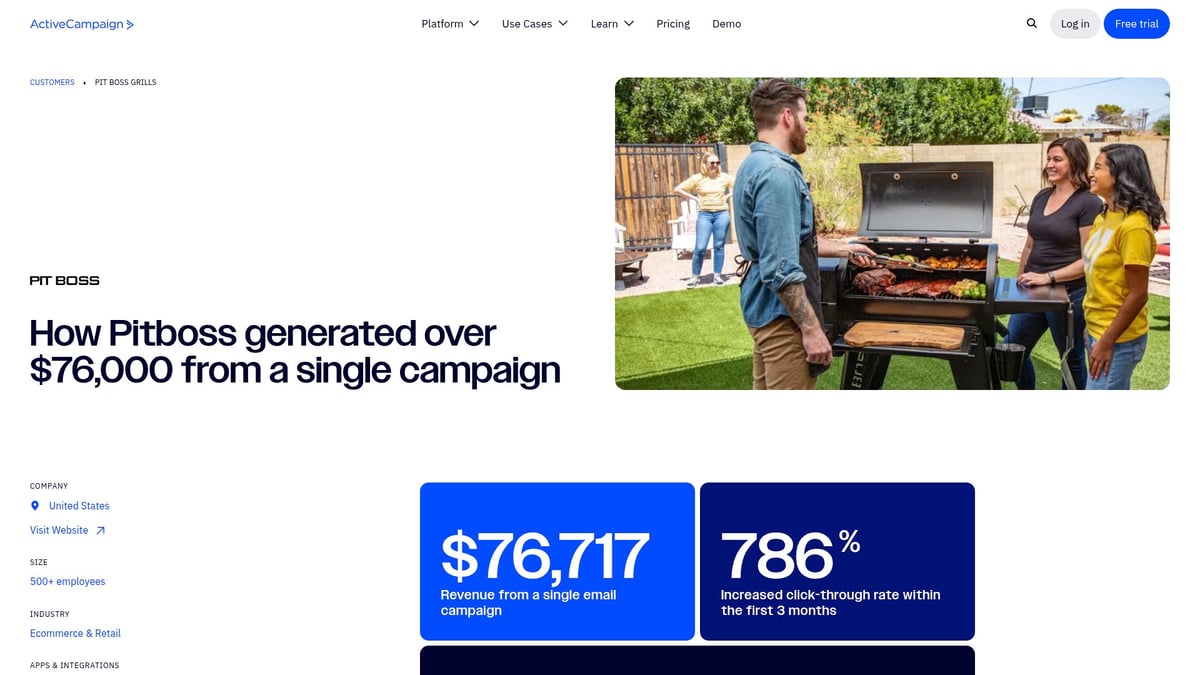
Key benefits include robust segmentation capabilities and multichannel automation that integrates seamlessly with human-driven interactions. This makes it ideal for SMBs and enterprises seeking to streamline their automation marketing tools stack.
Pros include customizability, strong deliverability, and an extensive library of integrations. However, its feature-rich interface might be overwhelming for newcomers. For example, businesses use it to nurture leads via email and SMS, leading to higher conversion rates.
2. HubSpot Marketing Hub
HubSpot Marketing Hub is a comprehensive solution among automation marketing tools, offering a free tier and paid plans from $15 per seat monthly, with enterprise options at $3,600 per month. Core features include inbound marketing, CRM integration, landing pages, workflow automation, and robust analytics.
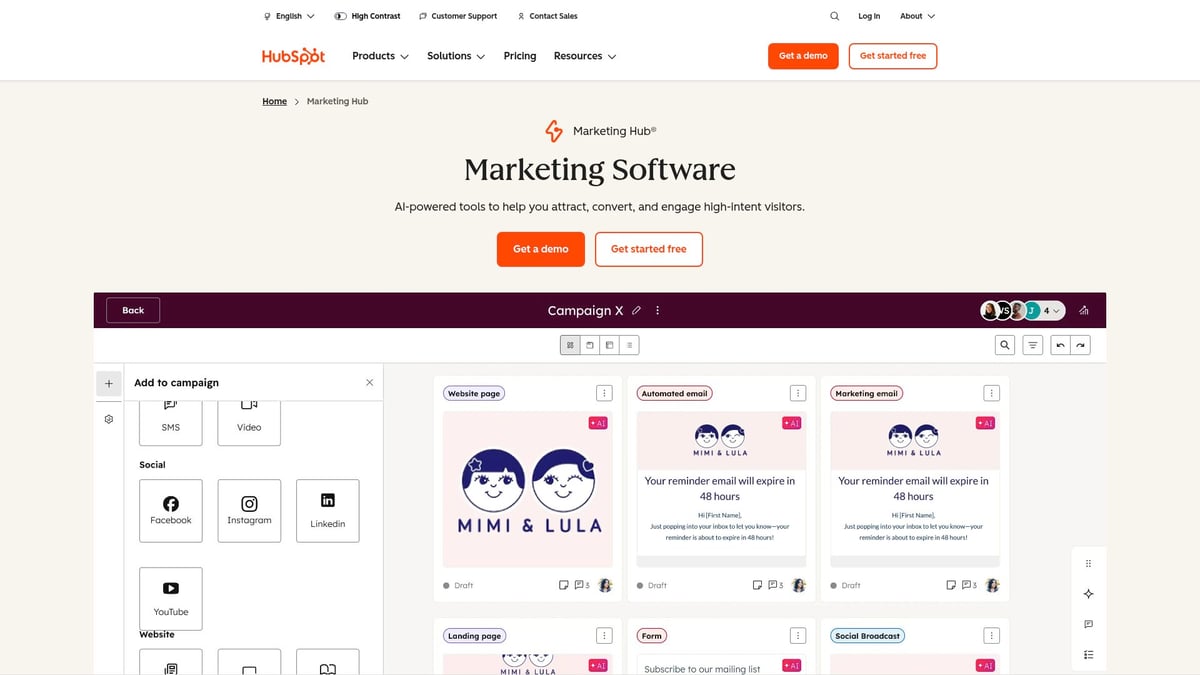
The all-in-one approach ensures seamless alignment between marketing, sales, and service teams. HubSpot is popular with startups, SMBs, and large enterprises focused on inbound strategies. Its pros are user-friendly design, a wealth of educational resources, and an excellent CRM. The main con is that advanced features can become expensive as your needs grow. A typical use case is automating lead capture and nurturing for B2B SaaS companies.
3. Omnisend
Omnisend shines among automation marketing tools for e-commerce and DTC brands. It offers a free plan, with paid packages starting at $16 per month. Core features include omnichannel automation across email, SMS, push notifications, and Messenger, plus a drag-and-drop builder and segmentation tools.

Its unified approach enables brands to create seamless customer journeys. Omnisend is easy to set up, integrates with major e-commerce platforms, and provides strong customer support. However, SMS credits are an extra cost, and advanced analytics are limited on lower tiers. Retailers often use Omnisend to automate cart abandonment and re-engagement campaigns, boosting sales.
4. Zapier
Zapier is a leader in workflow automation marketing tools, offering a free tier and paid plans beginning at $19.99 monthly. With 8,000+ app integrations, no-code automation, advanced triggers, and AI orchestration, Zapier connects disparate marketing tools for end-to-end process automation.
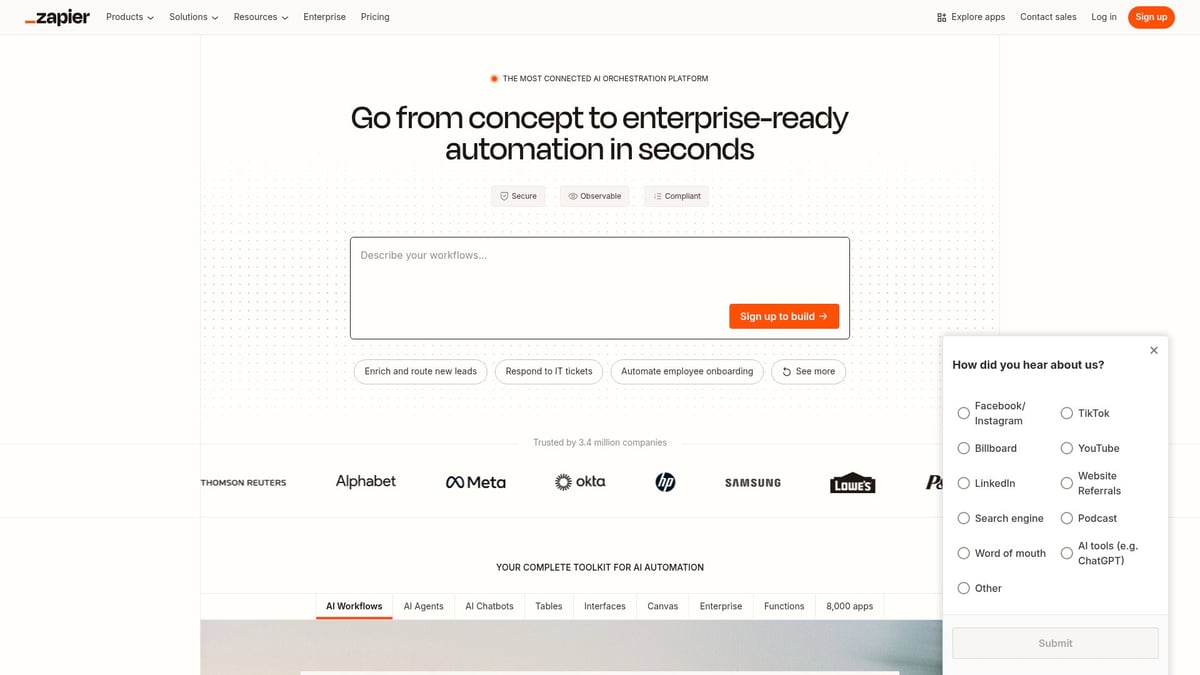
It is suitable for businesses of all sizes needing custom workflows. The main advantages are flexibility, vast integration options, and advanced AI features. On the downside, complex workflows may require a learning curve, and lower plans have task limits. A common example: automating lead transfers from web forms to CRM and email platforms.
5. Marketo Engage (Adobe)
Marketo Engage is an enterprise-grade option among automation marketing tools, with custom pricing tailored for large organizations. Its features include multichannel campaign management, advanced lead nurturing, account-based marketing, and in-depth analytics.
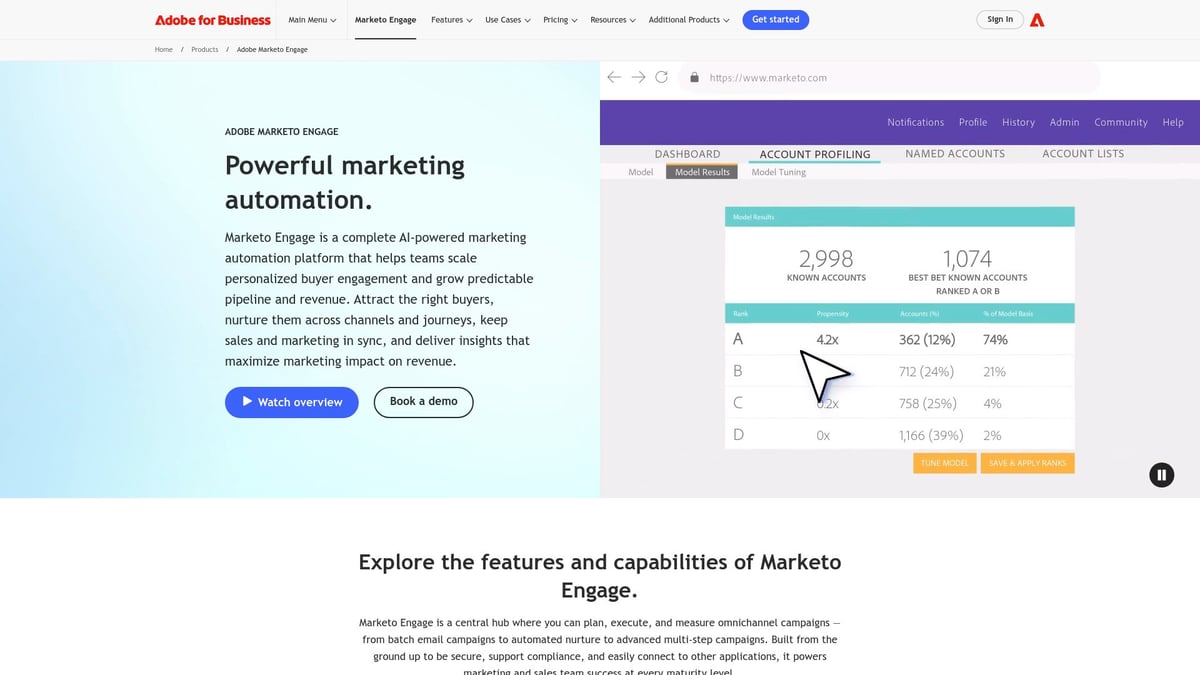
Marketo’s strengths are scalability, deep personalization, and robust integration options, making it ideal for enterprises and B2B marketers. Pros are its powerful automation and advanced segmentation, while cons include high cost and complex setup for smaller teams. Global brands use Marketo to orchestrate complex, multistage campaigns that drive measurable ROI.
6. Sender
Sender offers one of the most affordable automation marketing tools, with a free plan for up to 2,500 subscribers and paid plans starting at $7 per month. Its core features include email and SMS automation, segmentation, and a pop-up/form builder.
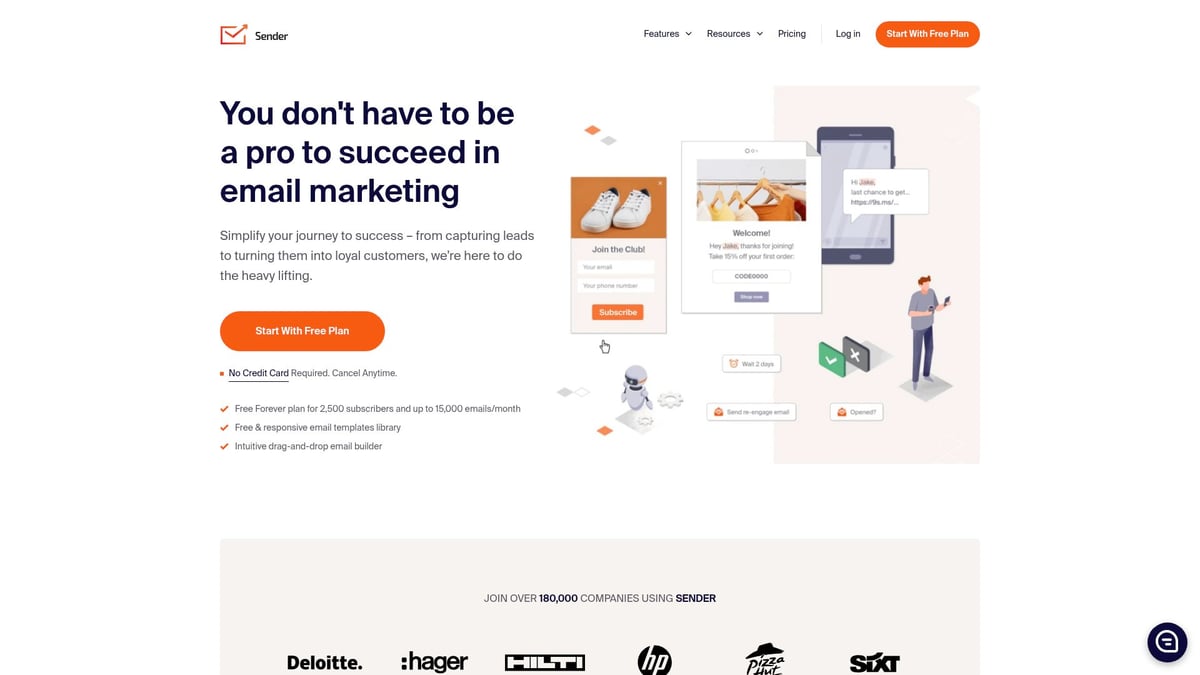
Sender’s intuitive interface and generous free plan make it appealing for e-commerce, bloggers, and startups. Its pros are ease of use and excellent value, though it lacks some advanced features found in enterprise solutions. E-commerce stores often use Sender to automate welcome emails and promotional SMS, building lasting customer relationships.
7. Oracle Eloqua
Oracle Eloqua is a powerhouse in automation marketing tools for large enterprises, with pricing starting at $2,000 per month and standard plans at $4,000. It offers lead management, campaign automation, over 500 integrations, and advanced analytics.
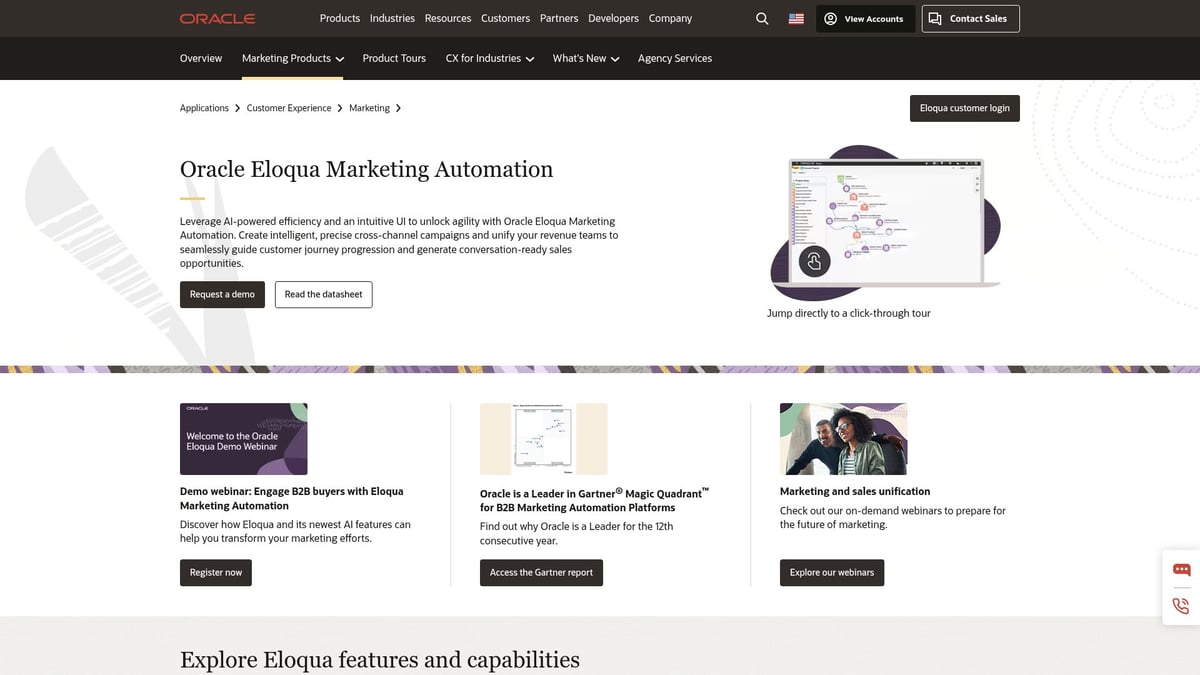
Eloqua’s enterprise-grade features and customizability set it apart for B2B marketers. Pros include a robust integration ecosystem and scalable architecture. The cons are high entry costs and a steep learning curve. Enterprises use Eloqua to manage complex lead nurturing workflows across multiple business units.
8. Brevo (formerly Sendinblue)
Brevo stands out among automation marketing tools for its affordability and flexibility. It offers a free plan and paid options from $25 per month. Core features include email, SMS, chat, CRM, automation, and transactional messaging.
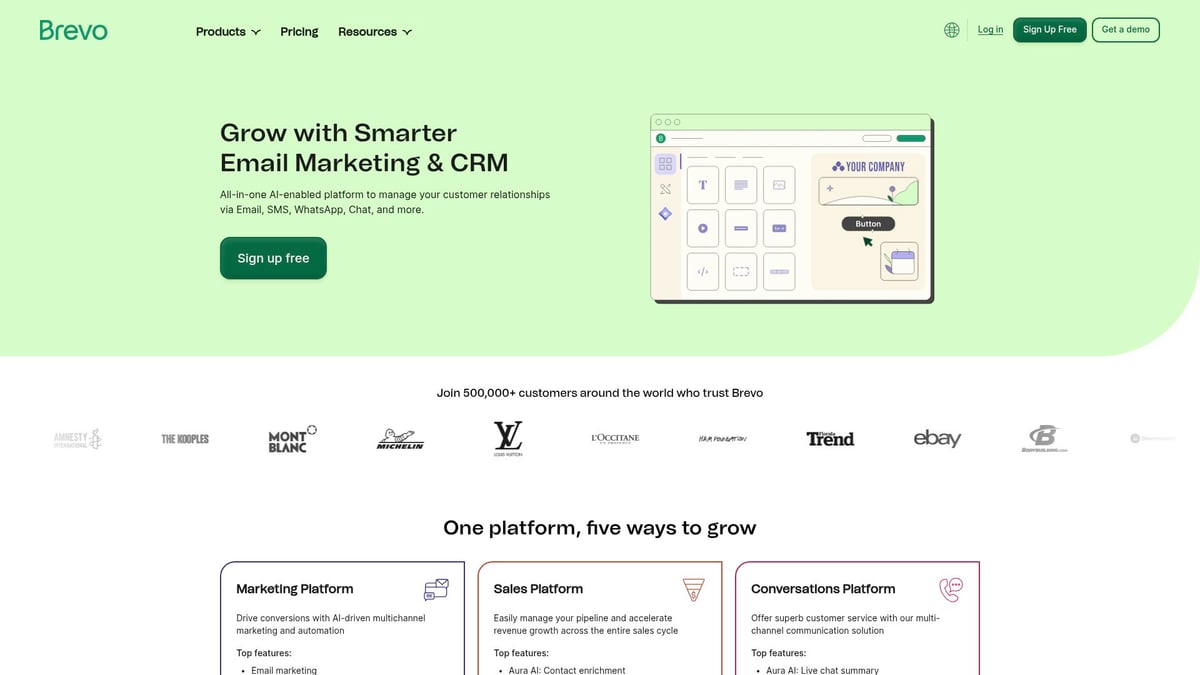
Brevo is ideal for SMBs, agencies, and non-profits, providing strong deliverability and multilingual support. Its GDPR compliance is a key benefit. Some advanced features are only available on higher plans. Non-profits, for example, use Brevo to automate donor communications and event reminders, maximizing engagement.
9. Mailchimp
Mailchimp is one of the most recognizable automation marketing tools, with a free tier and paid plans starting at $13 monthly. It features email automation, audience segmentation, landing pages, and analytics, making it especially popular with small businesses and startups.
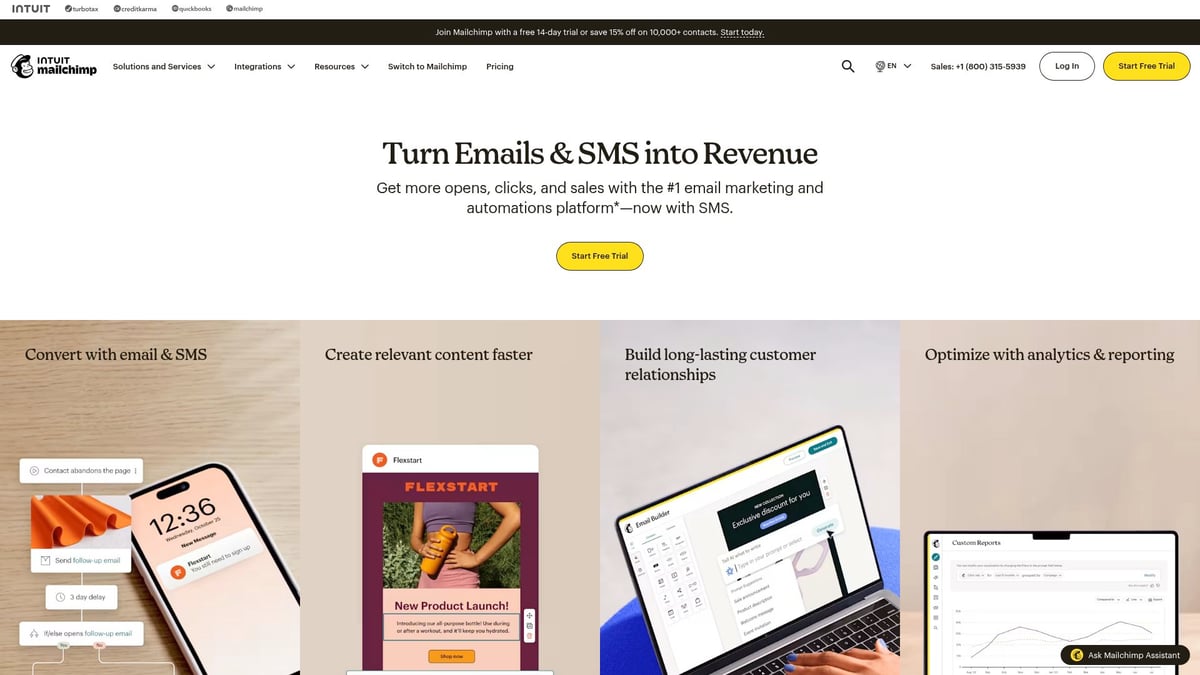
Mailchimp is known for its intuitive interface, broad integration capabilities, and a generous free plan. Pricing increases with list size, and automation features are limited on the free plan. Freelancers often use Mailchimp to automate newsletters and follow-up sequences, saving time and improving outreach.
10. Customer.io
Customer.io caters to SaaS, tech startups, and product-led companies needing powerful automation marketing tools. Pricing starts at $100 per month. It features workflow automations, personalized messaging, segmentation, and real-time event tracking.
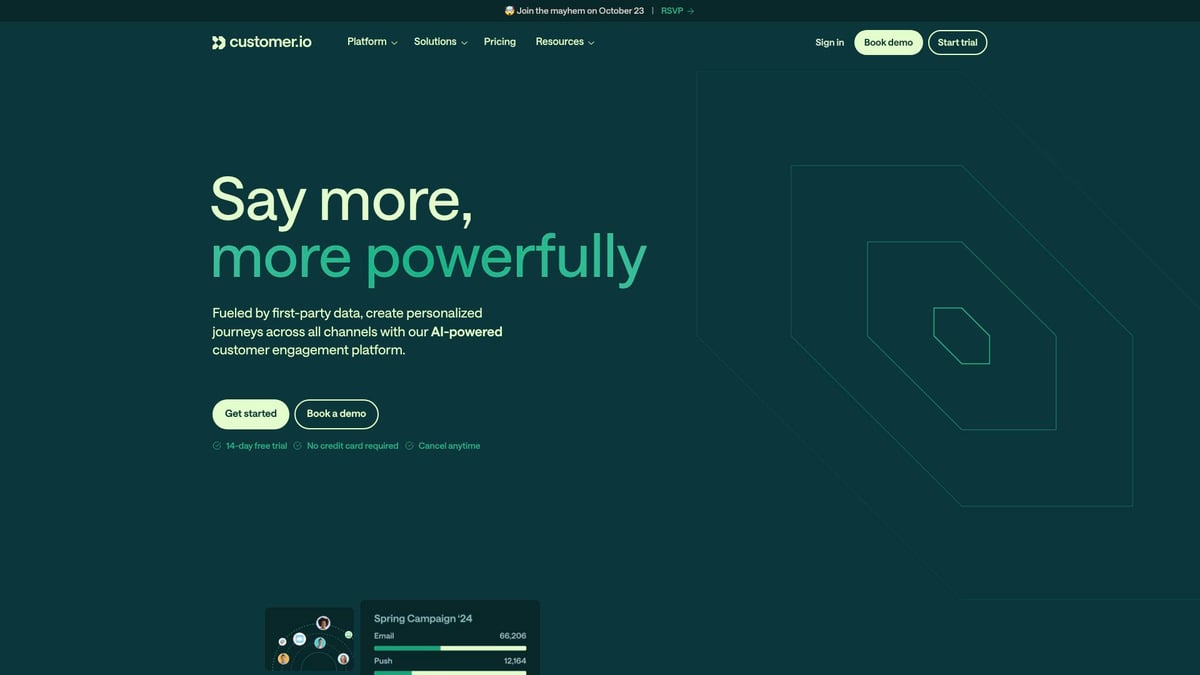
Customer.io’s workflow builder and high deliverability rates are standout benefits. Pros include customizability and a developer-friendly API, while cons are a higher starting price and a steeper learning curve for non-technical users. SaaS businesses typically automate onboarding and usage-based messaging with Customer.io, driving user engagement and retention.
Comparison Table: Top Automation Marketing Tools for 2025
| Tool | Best For | Free Plan | Starting Price | Channels Supported | Notable Feature |
|---|---|---|---|---|---|
| ActiveCampaign | SMBs, Enterprises | No | $15/mo | Email, SMS | Advanced segmentation |
| HubSpot | All business sizes | Yes | $15/seat/mo | Email, CRM, Social | All-in-one platform |
| Omnisend | E-commerce, Retail | Yes | $16/mo | Email, SMS, Push | Omnichannel journeys |
| Zapier | Custom workflow automation | Yes | $19.99/mo | All (via integrations) | No-code automation |
| Marketo | Enterprises, B2B | No | Custom | Multichannel | Account-based mktg |
| Sender | SMBs, Bloggers | Yes | $7/mo | Email, SMS | Affordable automation |
| Eloqua | Large Enterprises, B2B | No | $2,000/mo | Multichannel | 500+ integrations |
| Brevo | SMBs, Non-profits | Yes | $25/mo | Email, SMS, Chat | GDPR compliance |
| Mailchimp | Small Businesses, Startups | Yes | $13/mo | Email, Landing Pages | Easy to use |
| Customer.io | SaaS, Tech Startups | No | $100/mo | Email, SMS, Events | Real-time triggers |
This roundup of automation marketing tools empowers businesses to streamline workflows, engage customers, and drive measurable results in 2025. Explore these options to find the best fit for your needs and start transforming your marketing outcomes today.
How to Choose the Right Automation Marketing Tool for Your Business
Selecting the best automation marketing tools for your business can feel overwhelming given the sheer variety of platforms available. The right choice will empower your team, improve efficiency, and fuel long-term growth. By following a structured approach, you can confidently identify the perfect fit for your unique needs.
Assess Your Marketing Needs
Begin by evaluating your current marketing maturity. Are you running basic campaigns, or do you manage complex, multichannel initiatives? Consider team size, technical skill, and your existing workflow. Automation marketing tools range from simple to highly advanced, so matching tool complexity with your team's capabilities ensures a smoother adoption.
Set Clear Objectives and Budget
Define your primary objectives before exploring automation marketing tools. Are you focused on lead generation, nurturing, multichannel engagement, or analytics-driven campaigns? Knowing your goals will help you prioritize features. Budget is another crucial factor. Many platforms offer free plans or scalable pricing, making it easier to find an option that delivers a strong ROI.
Integration, Usability, and Scalability
Seamless integration with your CRM, e-commerce, and analytics platforms is vital. Check if your preferred automation marketing tools connect effortlessly to your existing stack. Usability matters, too. Look for intuitive interfaces, robust onboarding, and responsive support. As your business grows, choose a solution that scales, supporting future channels and advanced automations. For practical tips on integrating new platforms into existing workflows, see Automation strategies for marketing.
Security, Compliance, and Testing
Data privacy and compliance are non-negotiable. Ensure the automation marketing tools you consider meet GDPR and other relevant regulations, especially if you operate internationally. Always test platforms using free trials or demos. This hands-on approach allows you to evaluate real-world usability and feature sets before making a long-term commitment.
Comparison Table: Key Evaluation Criteria
| Criteria | Why It Matters | What to Look For |
|---|---|---|
| Integration | Streamlines workflows | CRM, analytics, e-commerce compatibility |
| Usability | Speeds up adoption | Intuitive UI, onboarding resources |
| Scalability | Supports future growth | Flexible plans, advanced features |
| Security & Compliance | Protects customer data | GDPR, encryption, privacy certifications |
| Pricing | Aligns with budget | Free plans, tiered options, transparent costs |
Final Tips for Choosing Automation Marketing Tools
Ultimately, the best automation marketing tools align with your team's skills, business goals, and future ambitions. Take advantage of trials, prioritize seamless integration, and never compromise on security. By following these steps, you can confidently select a platform that drives measurable results.
Future Trends in Marketing Automation for 2025 and Beyond
The landscape of automation marketing tools is rapidly evolving, driven by technology, consumer expectations, and market growth. As we look ahead to 2025 and beyond, several trends are poised to redefine how businesses approach marketing automation. According to marketing automation market growth projections, the adoption of these platforms is expected to surge, making it essential for brands to stay ahead of the curve.
AI-Driven Personalization and Predictive Analytics
Artificial intelligence is at the heart of next-generation automation marketing tools. In 2025, machine learning will power hyper-personalized campaigns, enabling marketers to deliver the right message to the right audience at the perfect time. Predictive analytics will help anticipate customer behaviors, allowing for proactive engagement.
Businesses leveraging artificial intelligence marketing solutions can expect smarter segmentation, automated content recommendations, and dynamic product suggestions. This level of personalization not only boosts engagement but also drives measurable ROI.
Omnichannel Orchestration
Consumers interact with brands across a range of channels, from email and SMS to social media and chat. Automation marketing tools are evolving to provide seamless omnichannel experiences, ensuring customers receive consistent messaging wherever they are.
- Unified customer journey mapping
- Automated cross-channel campaigns
- Real-time channel switching based on user behavior
This orchestration enhances engagement, improves customer satisfaction, and strengthens brand loyalty.
Expanding Integration Ecosystems
Modern automation marketing tools are no longer isolated platforms. Open APIs and robust app marketplaces are making it easier to connect marketing, sales, and analytics tools for a unified workflow. This integration ensures that data flows seamlessly between systems.
Companies benefit from:
- Centralized customer profiles
- Automated data syncing
- Streamlined reporting and analytics
Integration is now a critical criterion when evaluating future-ready solutions.
Conversational Marketing and Privacy-First Automation
Chatbots and messaging automation are transforming how brands engage with customers in real time. Conversational marketing allows for personalized, immediate responses, driving higher conversion rates and satisfaction.
At the same time, privacy concerns are shaping the evolution of automation marketing tools. Enhanced consent management, GDPR compliance, and transparent data practices are now baseline requirements. Businesses must prioritize tools that safeguard customer data and build trust.
Automation for SMBs and Visual Workflow Builders
The democratization of automation is making advanced marketing capabilities accessible to small and mid-sized businesses. Affordable, user-friendly automation marketing tools now offer powerful features once reserved for enterprises.
Visual workflow builders are simplifying automation for non-technical users. Drag-and-drop interfaces enable teams to design complex campaigns without coding expertise, accelerating adoption and innovation.
Real-Time Analytics and Agile Optimization
Instant access to campaign performance data is a game changer. Automation marketing tools in 2025 will emphasize real-time analytics, giving marketers the ability to monitor results, identify trends, and make agile adjustments.
This feedback loop supports continuous improvement, ensuring every campaign is optimized for maximum impact.
Staying informed about these future trends will help businesses harness the full potential of automation marketing tools, driving growth and sustainable success in a competitive digital landscape.
